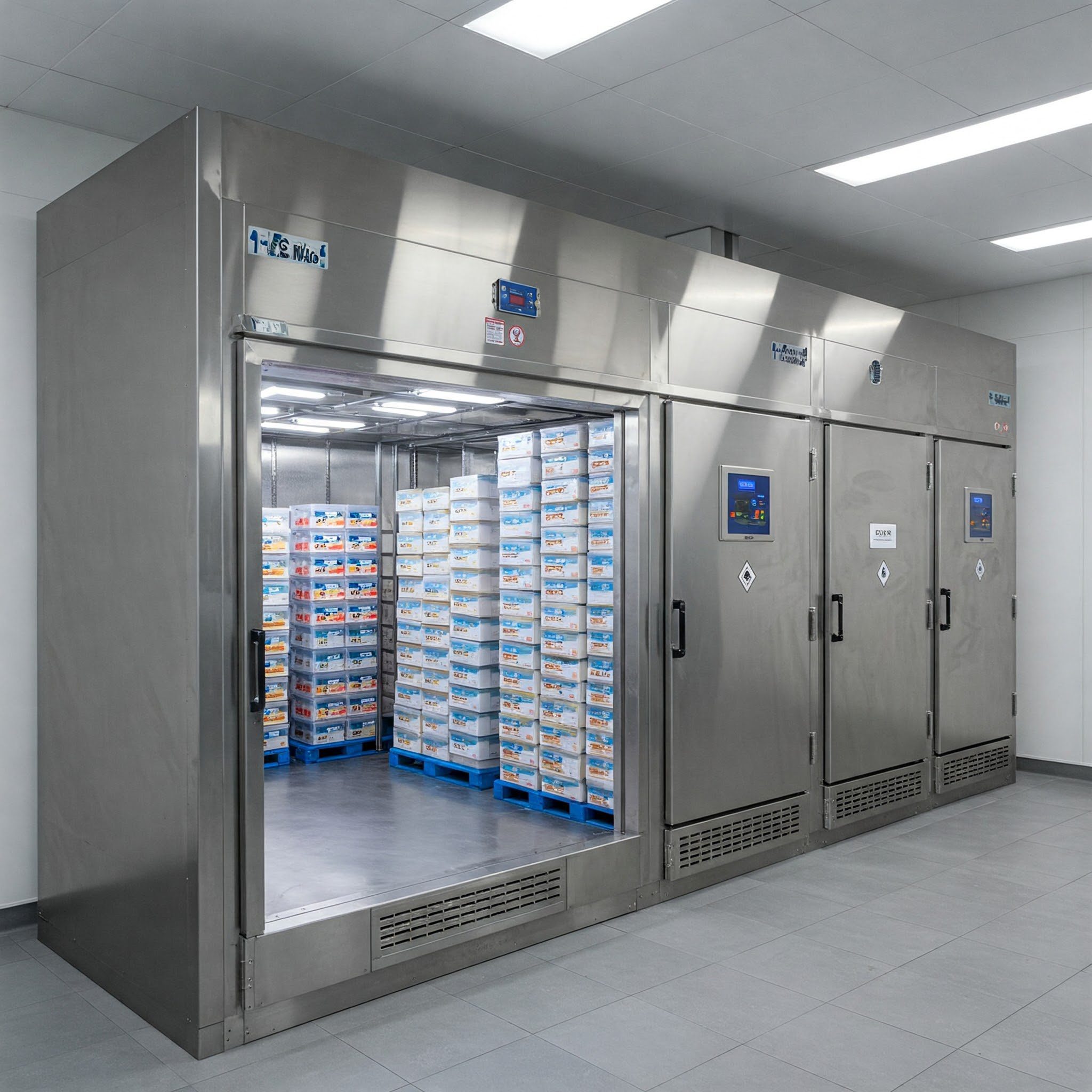Integrated Freezer Rooms: Custom Cold Storage Solutions for Businesses
Integrated freezer rooms are high-capacity, temperature-controlled storage units designed for commercial and industrial applications. Unlike standalone freezers, these custom-built rooms provide efficient bulk storage, precise temperature control, and energy-saving insulation, making them ideal for restaurants, supermarkets, warehouses, and pharmaceutical industries.
Whether you need a walk-in freezer for bulk food storage or a specialized cold room for temperature-sensitive products, choosing the right integrated freezer room ensures optimal preservation, cost savings, and operational efficiency.
What Are Integrated Freezer Rooms?
Integrated freezer rooms are custom-designed cold storage facilities built within existing structures or as standalone units. They maintain sub-zero temperatures to preserve frozen goods efficiently. Unlike modular freezers, integrated freezer rooms are designed for seamless operation within an existing workspace, maximizing space efficiency and energy performance.
They are commonly used in:
- Restaurants & catering businesses – For bulk storage of meat, seafood, and frozen ingredients.
- Supermarkets & grocery stores – To store large quantities of frozen products.
- Pharmaceutical & medical industries – For temperature-sensitive medicines and vaccines.
- Food manufacturing & processing plants – To preserve frozen foods and raw materials.
- Hospitality & hotels – For high-volume frozen food storage.
Types of Integrated Freezer Rooms
1. Walk-In Freezer Rooms
- Description: Large, temperature-controlled rooms designed for easy access and organized frozen storage.
- Best For: Restaurants, hotels, and catering services.
- Temperature Range: -18°C to -25°C (0°F to -13°F).
- Advantages:
- Ample storage space for bulk frozen goods.
- Customizable shelving and racking systems.
- Energy-efficient insulation to reduce power consumption.
2. Industrial Freezer Rooms
- Description: Large-scale freezers designed for warehouses, distribution centers, and food processing plants.
- Best For: Large food suppliers, logistics companies, and wholesale distributors.
- Temperature Range: -25°C to -40°C (-13°F to -40°F).
- Advantages:
- Massive storage capacity for large inventories.
- Heavy-duty construction for long-term durability.
- Advanced temperature control for extreme freezing conditions.
3. Pharmaceutical & Medical Freezer Rooms
- Description: Precision-controlled freezer rooms built for storing vaccines, medicines, and lab samples.
- Best For: Hospitals, laboratories, and biotech companies.
- Temperature Range: -40°C to -80°C (-40°F to -112°F) for ultra-low temperature storage.
- Advantages:
- Strict temperature stability for sensitive products.
- Equipped with backup power and alarm systems.
- Complies with FDA and WHO pharmaceutical storage regulations.
4. Blast Freezer Rooms
- Description: High-performance freezers designed to rapidly freeze food products to preserve freshness.
- Best For: Meat processing, seafood storage, and frozen meal manufacturers.
- Temperature Range: -30°C to -40°C (-22°F to -40°F).
- Advantages:
- Prevents ice crystal formation, maintaining food texture and quality.
- Reduces freezing time, improving efficiency.
- Essential for food safety compliance.
5. Low-Temperature Laboratory Freezer Rooms
- Description: Specialized freezer rooms designed for scientific research and biotech storage.
- Best For: Research institutions, vaccine storage, and biological sample preservation.
- Temperature Range: -40°C to -80°C (-40°F to -112°F).
- Advantages:
- Ultra-low temperature settings for fragile biological materials.
- Strict compliance with laboratory safety standards.
- Equipped with temperature alarms and monitoring systems.
Key Features of Integrated Freezer Rooms
- Customizable Sizes & Layouts – Designed to fit specific business needs.
- Precise Temperature Control – Ensures consistent freezing conditions.
- High-Quality Insulation – Reduces energy consumption and temperature fluctuations.
- Adjustable Shelving & Racking – Maximizes storage efficiency and organization.
- Advanced Refrigeration Systems – Includes eco-friendly, energy-saving options.
- Backup Power & Safety Systems – Ensures operation during power outages.
- Hygienic & Easy-to-Clean Interiors – Designed for food safety compliance.
Applications of Integrated Freezer Rooms
- Food & Beverage Industry – Storing frozen meat, seafood, dairy, and desserts.
- Retail & Supermarkets – Keeping bulk frozen goods at optimal conditions.
- Pharmaceutical & Medical Storage – Preserving vaccines, medicines, and lab specimens.
- Hospitality & Catering – Ensuring continuous frozen food supply.
- Industrial & Cold Chain Logistics – Managing temperature-controlled shipping and storage.
Benefits of Integrated Freezer Rooms
- Custom-Built for Business Needs – Designed for specific storage and operational requirements.
- Maximum Storage Efficiency – Allows for organized bulk inventory management.
- Energy-Efficient Design – Uses advanced insulation and eco-friendly cooling systems.
- Improved Product Shelf Life – Keeps frozen goods fresh and safe for extended periods.
- Scalable & Expandable – Can be expanded as business demands grow.
- Meets Industry Standards – Ensures compliance with food safety and pharmaceutical regulations.
Maintenance Tips for Integrated Freezer Rooms
Daily Maintenance
- Monitor and record temperature settings for consistency.
- Keep doors closed when not in use to prevent temperature fluctuations.
- Inspect door seals and gaskets for proper sealing.
Weekly Maintenance
- Clean interior surfaces with food-safe disinfectants.
- Remove any expired or spoiled products.
- Inspect and test alarm and backup power systems.
Monthly Maintenance
- Check for ice buildup and defrost if necessary.
- Clean condenser coils to maintain efficient cooling performance.
- Inspect fans and ventilation for proper airflow.
Troubleshooting Common Issues
1. Freezer Room is Not Cooling Properly
- Cause: Dirty condenser coils, refrigerant leaks, or overloading.
- Solution: Clean the coils, check refrigerant levels, and reduce stock load.
2. Excessive Ice Buildup
- Cause: Faulty door seals or humidity inside the freezer.
- Solution: Replace damaged seals and ensure proper ventilation.
3. High Energy Consumption
- Cause: Poor insulation or inefficient cooling system.
- Solution: Upgrade insulation and schedule routine servicing.
4. Unusual Noises from the Cooling System
- Cause: Loose components or a failing compressor.
- Solution: Tighten fittings and seek professional servicing if needed.
Choosing the Right Integrated Freezer Room
Factors to Consider:
Budget & Installation Costs – Balance initial investment with long-term savings.
Size & Capacity – Based on business needs and available space.
Temperature Range – Choose between standard freezing, deep freezing, or blast freezing.
Energy Efficiency – Opt for advanced insulation and energy-saving refrigeration.
Shelving & Storage Solutions – Consider custom racks for optimized space use.
Backup Power & Monitoring Systems – Ensures continuous operation and safety compliance.


